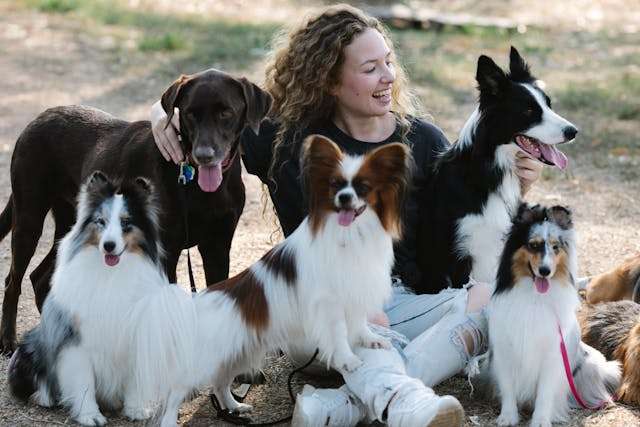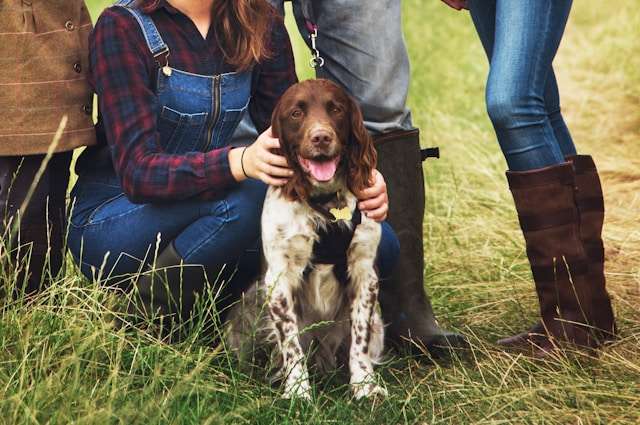Find the Best Dog Breed for You: Take the Quiz Today!

Find the Best Dog Breed for You: Take the Quiz Today! Choosing the right dog breed is a big decision, but it doesn’t have to be overwhelming.
A quick quiz can help match your lifestyle to a breed that fits perfectly. Finding the right companion matters whether you’re active, laid-back, or somewhere in between.
For more insights, check out our dog breed guide to explore your options further. This tool is here to make your search easier and more personalized. Ready to meet your match? Let’s find out!
Understanding Your Needs
Choosing a dog is more than picking a cute face from a litter. You’re adopting a companion, a family member, and a partner for your daily life. Before settling on a breed, assessing your needs and circumstances is essential. Let’s break it down into key factors that can determine which dog is the perfect fit for you.
Lifestyle Considerations
Your lifestyle is a huge factor in determining the right dog for you. Are you working long hours, or do you have a flexible schedule? Dogs need attention, some more than others. For someone often away from home, a more independent breed like a Chow Chow might work better than a breed like a Golden Retriever that thrives on constant human interaction.
Live in an apartment? Then, a smaller or low-energy breed, such as a French Bulldog, could be a better match. If you’re a frequent traveler, consider whether you’ll have a pet-friendly travel plan or need a breed that adapts well to boarding situations.
For more guidance, you can check out this comprehensive guide to dog breeds for every lifestyle from K9Nutripick.
Activity Level
Do you love hitting the trails or prefer curling up with a book on the weekend? Matching your activity level with a dog’s energy needs can make all the difference in your relationship.
High-energy breeds, like Border Collies and Australian Shepherds, need lots of physical challenges and mental stimulation. Without it, they might turn that energy into destructive behavior. Conversely, more relaxed breeds like Basset Hounds or Shih Tzus are happy with shorter walks and cozy evenings.
If you’re still unsure about energy requirements, tools like the AKC Breed Selector Tool can help you find dog breeds that align with your activity level.
Family Dynamics
The size and composition of your family also play a significant role in choosing the right breed. Do you have young kids? Breeds like Labradors and Beagles are famously patient and gentle with children. Seniors in the house? Consider a calm, smaller breed like a Cavalier King Charles Spaniel for companionship without too much energy.
However, if your family is active and outgoing, a playful breed like a Boxer might be your family’s new best friend. And don’t forget allergies—hypoallergenic breeds like Poodles can ensure everyone stays comfortable.
Look at the AKC’s guide on choosing the right breed for your family for even more family-friendly insights.
Photo to Enhance the Article

Photo by K Zoltan
Assessing these critical factors can save you and your future pup from unnecessary stress and ensure a happier, more fulfilling relationship. Continue reading to discover even more insights into finding your perfect dog match!
Dog Breed Characteristics
When choosing a dog, understanding breed characteristics is essential. Different dogs bring unique qualities that can either match or challenge your lifestyle. Each breed type, from temperament to health, carries distinct traits, making it vital to align them with your needs.
Small vs. Large Breeds
Size matters when picking a dog. Small breeds, like Chihuahuas or Dachshunds, are ideal for apartments or city living. They’re easier to carry, cost less to feed, and require less space. However, they can be fragile, requiring extra care around children or busy environments.
In contrast, larger breeds, such as Golden Retrievers or Great Danes, tend to be more robust and laid back. They often excel as family dogs, especially for individuals with suburban homes and spacious yards. On the flip side, they need more food and exercise, which can be harder to transport.
Ultimately, this choice boils down to your living arrangements and personal preferences. For more insights into specific breed traits, check out the comprehensive guide on Poodles tailored to fit different needs.
Temperament and Behavior
A dog’s personality is just as important as its size. Breeds like Labrador Retrievers are friendly, outgoing, and great with kids. In comparison, more aloof breeds like Basenjis might bond with just one or two people.
Dogs from working groups, like Huskies, are high-energy and need constant stimulation. If you’re looking for a couch companion, breeds like Bulldogs are low-energy and content with short walks. Herding breeds, such as Border Collies, are intelligent and thrive on tasks, but they can become destructive if left without work.
Understanding temperament helps you avoid mismatched relationships. For a broad overview of breed traits, see the AKC’s dog breeds list highlighting behavior and care tips.
Health Considerations
Health is a critical factor when picking a dog. Smaller breeds, like Yorkshire Terriers, often face dental issues, while larger breeds, such as German Shepherds, are prone to hip dysplasia. Flat-faced dogs, like Pugs, may experience breathing problems.
Some breeds require more frequent vet visits or special care. Working dogs may need joint health supplements, while breeds prone to obesity need a stricter diet. Investing in pet insurance might help manage these long-term costs. You can explore more about managing dog health efficiently on DogTime’s breed characteristics page.

Photo by Alotrobo
Choosing a breed that fits your lifestyle, temperament preferences, and health expectations ensures a happy, long-lasting companionship. Continue delving into understanding how these factors interplay before finalizing your decision.
The Dog Breed Quiz
Finding the perfect dog breed for your lifestyle can feel overwhelming. Enter the dog breed quiz—a simple, fun, and surprisingly accurate tool to guide future dog owners toward their ideal pup. Let’s explore how it works, interpret the results, and find more resources to deepen your understanding.
How the Quiz Works
The dog breed quiz is tailored to collect specific details about your lifestyle, preferences, and needs. Through carefully structured questions, it evaluates compatibility across key factors:
- Lifestyle: Are you more active or laid-back? Do you live in a home or an apartment?
- Family Setup: Do you need a kid-friendly breed or one suited for seniors?
- Care Preferences: Do you mind grooming high-maintenance coats, or do you favor low-maintenance breeds?
- Activity Level: Do you want a jogging partner, or is a couch companion more your speed?
Answers are analyzed to generate personalized breed matches. For instance, someone with an active lifestyle might be paired with a Border Collie, while a relaxed homebody might get matched with a Bulldog. Think of it as matchmaking for your future furry best friend!
For a quick preview of what to expect, the AKC Breed Selector Tool is another excellent example of how these quizzes work.

Photo by Helena Lopes
Interpreting Your Results
Once you complete the quiz, you’ll be presented with dog breeds that best align with your answers. But what do you do with this information? Here are some tips:
- Research the Top Matches: Learn about the breed’s temperament, energy levels, and potential challenges.
- Assess Real-Life Feasibility: Can a high-energy breed like a Husky fit into your daily routine? Or would a smaller, low-maintenance breed be better?
- Prioritize Needs vs. Wants: A breed might meet your aesthetic preferences, but does it also meet your practical needs?
- Gather More Opinions: Dive into forums or communities for firsthand experiences from fellow dog owners. They offer valuable insights into living with different dog breeds.
Remember, the results are a guide, not a definitive answer. Use them as a starting point to narrow down your choices.
For more resources, check out the Dog Breed Guide: Find Your Perfect Companion, which provides in-depth breed profiles to help you make an informed decision.
Follow-Up Resources
Want to go beyond the quiz? Here are additional tools and guides to refine your search:
- Discover the Best Dog for Your Family to see which breeds match your family’s unique dynamics.
- Learn about tailored nutrition plans with Ollie Human-Grade Dog Food, starting with their comprehensive dog quiz for meal matching.
- Try the Iams Dog Breed Selector for another interactive way to identify your ideal pup.
Taking the time to explore these tools ensures you’re making a choice that leads to a lifelong, happy relationship with your new best friend. Keep reading for more ways to understand potential matches better!
Final Thoughts
Choosing the perfect dog breed is a journey that intertwines logic and emotion. Your new furry friend will likely become an integral part of your life, making it crucial to make a well-informed decision. As you reflect on your learning, consider how each breed’s traits align with your values and lifestyle. There’s no perfect answer, but an ideal match awaits you.
Personal Considerations
Before making your final choice, it’s always a good idea to revisit your top priorities:
- Time Commitment: Make sure the breed matches your availability. Busy schedule? Consider independent breeds like Greyhounds.
- Home Setup: Is your living space ready for a high-energy dog, or would a calm, smaller companion be better?
- Family Fit: A dog should complement your household dynamics, whether a busy family or a single-person home.
Be honest with yourself—this is about setting you and your future dog up for success. If you’re struggling to decide, forums like Reddit’s Puppy101 can provide firsthand experiences from other pet owners.
Learning from Others
It’s helpful to hear stories from those in your shoes. For instance, some people share their insights comparing rescue dogs and specific breeds on blogs like A Quick Guide to Choosing the Right Dog Breed for You. Experiences from real dog owners can highlight aspects not covered in quizzes or guides, like quirky behaviors or breed-specific challenges.

Photo by Laura Alessia
Next Steps
If you’ve taken the dog breed quiz, use your results as a starting point, not just a final answer. While quizzes narrow the field to compatible breeds, research, and interaction are equally critical. Meet dogs in person at shelters or through breeders to get a feel for their personalities.
You can check out resources like Choosing a Dog Breed for detailed dog profiles. They often provide insights into temperament, grooming needs, and health considerations.
Taking time to evaluate breeds will ensure a happier, more fulfilling companionship. Every dog deserves a loving, informed owner—could that owner be you?
FAQ: Common Questions About Choosing the Right Dog Breed
Picking the perfect dog breed is an exciting journey, but it often comes with many questions. Below, we’ll tackle some of the most frequently asked questions to simplify your decision-making process.
What Factors Should I Consider When Choosing a Dog Breed?
The best way to find the right breed is by aligning your lifestyle, activity level, and home environment with the dog’s needs. Are you highly active or prefer a laid-back lifestyle? Do you live in an apartment or house? Matching these factors is crucial to avoid challenges. Tools like the Dog Breed Selector can help refine your preferences.
How Accurate Are Dog Breed Quizzes?
Dog breed quizzes are a great starting point, offering tailored results based on your answers. While they aren’t definitive, they provide valuable guidance by factoring in energy level, size preferences, and maintenance requirements. Want to take one? Check out this fun dog breed quiz to get personalized suggestions.
Are Some Breeds Better Suited for Families with Kids?
Absolutely! Breeds like Labradors and Golden Retrievers are known for their patience and playful nature with kids. These dogs are often called family favorites due to their friendly and protective demeanor. Learn more tips on choosing a family dog in our guide, Are Corgis Good Dogs?

Photo by Simona Kidrič
What Are Low-Maintenance Dog Breeds for New Owners?
Breeds like Beagles, French Bulldogs, and Shih Tzus are low-maintenance and ideal for first-time dog parents. These dogs typically require less grooming, moderate exercise, and simple care routines. Check out The Ultimate Guide to Labrador Retriever Care for more detailed care information.
Are Certain Breeds Easier to Train?
Yes, some breeds like Border Collies, Poodles, and Labrador Retrievers are naturally more trainable due to their intelligence and eagerness to please. If you’re new to dog training, starting with a more adaptable breed can save you a lot of effort. Enhance your knowledge with this comprehensive training quiz.
Do Smaller Dogs Have Fewer Health Issues?
Not always. While smaller breeds like Chihuahuas often avoid significant dog problems like hip dysplasia, they may face dental issues. Conversely, larger breeds tend to have joint or heart-related conditions. Before deciding, research the specific health needs of any breed you’re considering.
Where Can I Learn More About Specific Breeds?
Explore in-depth resources, such as Unveiling The Newfoundland Dog Breed Personality, or check out breed-specific community forums for first-hand experiences. These platforms are treasure troves of knowledge for prospective dog owners.
By addressing these FAQs, you’ll be well-prepared to move closer to finding your perfect furry companion.
Conclusion
Choosing the best dog breed is about blending your needs with those of your future furry companion. Remember, the quiz results are a starting point, not a final decision.
As you narrow your choices, focus on lifestyle, activity level, and family dynamics. These details help ensure a long-lasting, joyful relationship with your pet.
If you’re still exploring options, consider resources like choosing the right Goldendoodle for your family for more insights. Or, dive further into breed traits that align with your life.
Take time to share the quiz with friends and family who might be searching for their best match. Every dog deserves an understanding owner prepared to meet their unique needs. Are you ready to meet yours?







One Comment